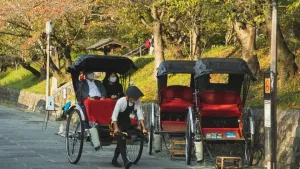In the midst of hosting the Olympics, Japan is experiencing a record surge in COVID cases. Two days ago, nearly 10,000 new cases were confirmed, more than any other day since the pandemic began. It’s not entirely clear if the current spike can be totally attributed to the games being hosted in Tokyo, but there’s no doubt that the increased international travel is contributing to the spread of the more transmissible Delta variant.
Given the risk, Japan has been following a policy requiring two week quarantines of international travelers, either in hotels, at home, or a mixture of both. As part of its enforcement, the government has begun a ‘name and shame’ campaign. Now, when individuals refuse to communicate with authorities or abide by the rules—which involve downloading an app with location tracking and keeping it on hand—the government announces the names of the rule-breakers to induce public shame.
Now, all kinds of arguments might be made about whether this is enough to keep people accountable and following the rules, but it is an idea worth taking a closer look at. Essentially, instead of trying to simply punish individuals with the direct force of law, the government has opted to utilize social expectations and social repercussions to change behavior.
And that is a sensible theory in a democracy. In such a political arrangement, there is a constant balancing act between the individual and the community. On the one hand, one of the excellent features of this form of government is that it allows people to shape their communities and live generally as they like. However, democracy can’t function if a society is lacking all community, if it is completely individual, every man for himself.
A democracy is a form of government, but it’s also a social agreement between citizens to live together, tolerate each other, and also work together to some extent to form a better country for each citizen. When you have no community, no sense of social commitment to fellow citizens, people are likely to live more carelessly, with less regard for how they might hurt other citizens. Of course, not all social agreements are prohibitive. Many are simply expectations to help each other out when needed, but rules about what one can’t or shouldn’t do are especially important in today’s pandemic when decisions with big social impacts might easily be mistaken for merely individual preferences.
In America, our criminal justice system largely fails to recognize the importance of community, and perhaps the model of communal scolding that Japan has adopted has lessons for us. Our system is built in part upon a Protestant foundation, which holds that wrong-doing is an individual sin in need of punishment. We often say we send people to prison ‘to pay a debt to society.’ While we claim that our system is focused on the violation of social agreements, American prisons have rarely, if ever, been in the business of rehabilitation: changing behavior through social consequence. Instead, we aim almost exclusively to make people suffer for their wrong-doings, as removed as possible from society.
When released from prison in America, one is regularly treated as an outsider. Jobs are harder to acquire. The stigma can be disabling, and returns to prison are far too common, at a rate of around 50 percent.
Japan’s policy is certainly not a perfect substitute for all crimes, especially violent ones, but it points to an important idea. To build community in a democratic society, communities must have some power to ‘police’ themselves, so to speak. Violations of social agreements must come with social consequences that allow a society to form its expectations and teach them through social interactions. At the end of the day, we aren’t really improving our communities by simply removing people who make mistakes and destroying their potential to better themselves and their surroundings. We are only limiting the potential of our communities and our fellow citizens. It’s worth thinking about how we can do better.


Comments
Join the conversation